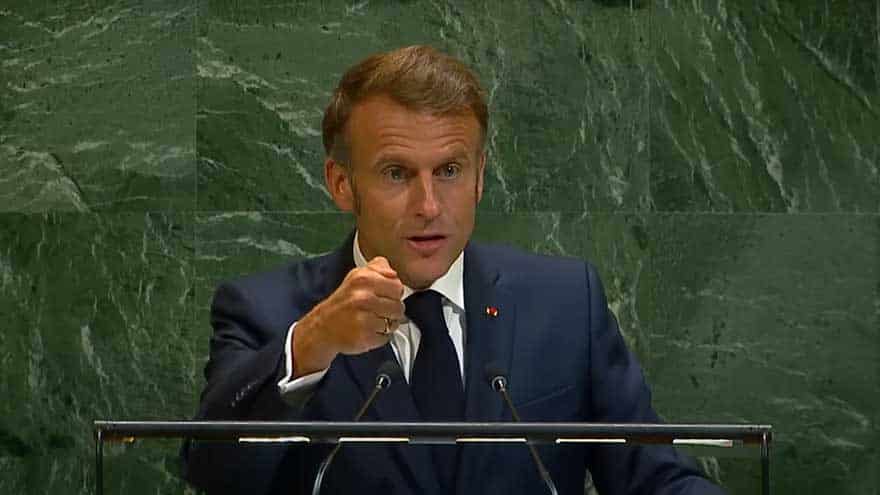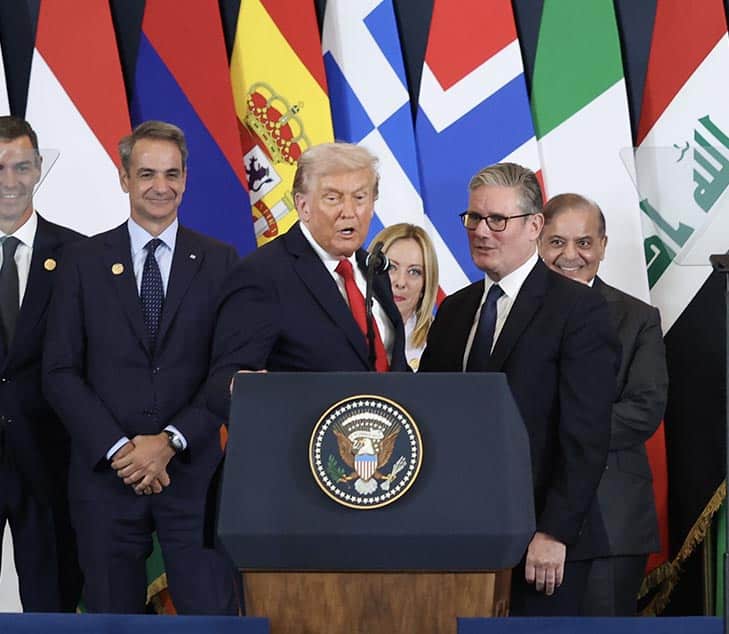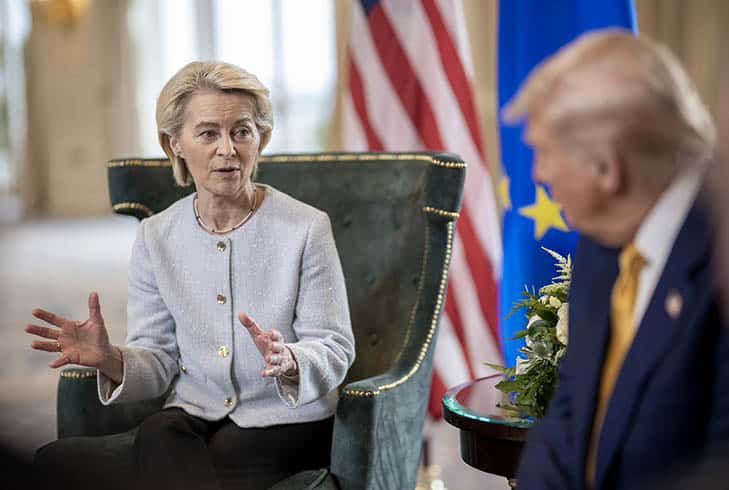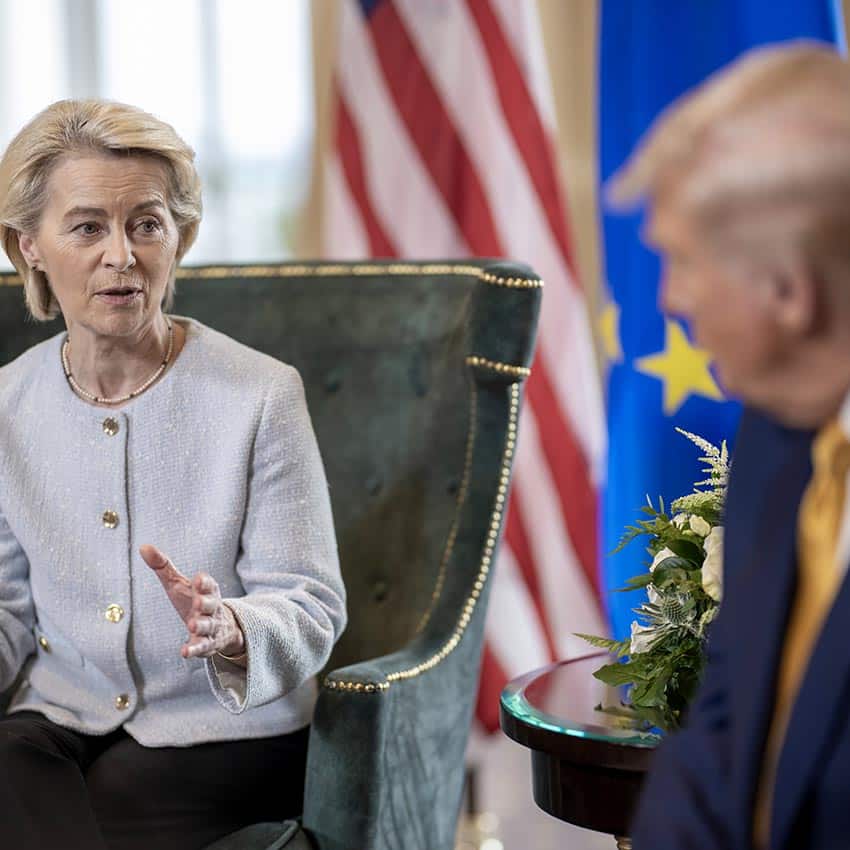When U.S. President Donald Trump announced his plan to end the war in Gaza, it was clear that this was not just another routine diplomatic initiative. The very signing of the agreement between Israel and Hamas marked a turning point—not only in the fighting in the Middle East but also in the relations between Jerusalem and European capitals, which in recent years, especially since the outbreak of the “Swords of Iron” war, have experienced ups and downs.
Trump’s plan, presented by the White House as a “comprehensive framework for the day after,” is not merely a ceasefire outline but an attempt to reshape Gaza’s political and economic landscape. Behind it lies the president’s desire to restore America’s position of global leadership—this time through economic and regional diplomacy.
Demilitarized Gaza, Open Economy
Trump’s framework is built on five main pillars, the first two of which have already been implemented, at least partially:
Cessation of hostilities – Upon signing the agreement, all military operations ceased. The IDF withdrew to agreed-upon lines to facilitate the release of hostages, and contact lines were frozen.
Release of hostages – Within 72 hours, all living hostages were returned, and in exchange, Israel released Palestinian prisoners, including hundreds serving life sentences and many others arrested after October 7, 2023. Hamas also pledged to return all deceased bodies, though as of this writing, it has not fully complied with this commitment.
Additional core components of the plan include:
Amnesty for Hamas members – After the hostages’ release, Hamas operatives who wish to do so will be offered the opportunity to lay down their arms and receive amnesty. Those seeking to leave may relocate to a country that accepts them.
Humanitarian aid and reconstruction – The Gaza Strip will be flooded with food, medical supplies, and construction materials under the supervision of the UN and the Red Crescent. The Rafah crossing will be opened in both directions.
Governance and security – The Strip will be temporarily administered by a Palestinian technocratic committee operating under a new international body called the “Peace Council,” headed by President Trump and including former leaders such as Tony Blair. An International Stabilization Force (ISF) will enter Gaza, train Palestinian police forces, and coordinate with Egypt and Israel to prevent arms smuggling and secure the borders.
The plan also includes a comprehensive economic vision, encompassing the establishment of a special trade zone in Gaza, substantial foreign investment, and the gradual integration of the Strip into the regional economy. Trump presented this as “peace through prosperity”—a sort of Middle Eastern Marshall Plan led by the United States and Arab partners.
According to the framework, Israel will neither annex Gaza nor exercise direct control over it but will maintain a peripheral security presence until complete demilitarization is ensured. In parallel, a gradual dialogue will open between Israel and the Palestinians regarding the future of their relations, which, according to the document, could ultimately lead to “Palestinian self-determination.”

Europe Responds: Different Voices, a Shared Message
The regional initiative launched by Trump was met with a mixture of caution and hope. While the Arab world reacted with relative restraint, in Europe there was a noticeable sense of unusual activity. The European Union, which had avoided direct involvement in the fighting for two years, saw Trump’s initiative as an opportunity to regain relevance in the Middle Eastern arena.
In an internal document from the European External Action Service, obtained by Reuters, it was stated that “the Union must influence the new reality in Gaza, join the Peace Council, and take part in strategic decisions.”
At a meeting of EU foreign ministers in Luxembourg, it was decided to open a dialogue with Washington regarding the Union’s role in implementing the plan. EU Foreign Affairs Chief Kaja Kallas welcomed the signing of the agreement, calling it “a real opportunity to end the war.” She described the framework as “a tremendous diplomatic achievement” and pledged that “the Union will do everything in its power to support the implementation of the agreement.” European Commission President Ursula von der Leyen added, “When the time comes for reconstruction, Europe will be there.” The message was clear: Europe wants to be part of the solution.
French President Emmanuel Macron announced, following the signing of the deal, an international summit in Paris with representatives from a range of Arab and Western countries—France, the United Kingdom, Germany, Italy, Spain, Jordan, Qatar, Saudi Arabia, the United Arab Emirates, Indonesia, Turkey, and Canada. The focus of the summit: “the day after” the war in Gaza. Macron stressed that the purpose of the summit was to advance Trump’s plan, saying that “this agreement must mark the end of the war and the beginning of a political solution based on the two-state framework.”
Italian Prime Minister Giorgia Meloni called it “amazing news—an extraordinary opportunity to end this conflict that must be seized.” Her foreign minister, Antonio Tajani, announced that Italy was ready to send a peacekeeping force to the region if required.
UK Prime Minister Keir Starmer also welcomed the agreement, calling it “a moment of relief felt around the world—especially among the hostages, their families, and Gaza’s civilian population, all of whom have endured unimaginable suffering over the past two years.” He added that it was “imperative” to fully implement the terms of the deal “without delay, alongside the immediate removal of all restrictions on life-saving humanitarian aid to Gaza.”
Dutch interim Prime Minister Dick Schoof expressed his support for the agreement, saying that the deal “must be a first step toward a sustainable and just peace. It could bring an end to the suffering endured by so many: the hostages and their families, and the people of Gaza.”
Spanish Prime Minister Pedro Sánchez voiced hope that “this may be the beginning of lasting and just peace. Now is the time for dialogue, to assist the civilian population, and to look forward with hope—but also with justice and remembrance—so that the horrors that occurred will not be repeated.”
Irish Prime Minister Micheál Martin called “on all sides to uphold the terms of the ceasefire, release all hostages, and allow a surge in humanitarian aid to the people of Palestine.” German Chancellor Friedrich Merz stated that “developments in Israel are encouraging.”
At first glance, the European Union was lining up behind the plan. But beneath the surface, tensions were brewing. Politico reported that the EU had frozen its plans to scale back trade relations with Israel and to impose sanctions on Ministers Itamar Ben-Gvir and Bezalel Smotrich. The policy shift occurred after several leading EU member states concluded that such sanctions were unnecessary at this stage, given the emerging Israel-Hamas agreement and Trump’s plan.
It appears that the president’s initiative has created internal divisions within the Union over whether to continue efforts to reduce trade ties and impose sanctions. Belgian Foreign Minister Maxime Prévot, whose country had pushed for a tougher stance toward Israel, said it was “regrettable” that it took the EU more than two years to present concrete measures against Israel. “The credibility of the EU’s foreign policy has been seriously damaged,” she added. By contrast, Germany, Hungary, and several other EU members firmly oppose implementing the sanctions.
Following the signing of the first phase of the Israel-Hamas agreement to end the war, the EU may reassess its position on the sanctions issue. A European Commission spokesperson even hinted that the Union might revise its stance, stating: “The sanctions were proposed in a particular context, and if the context changes, that could ultimately lead to a change in the proposal.”
However, according to Politico, the European Commission does not currently intend to withdraw the sanctions plan, even if the prospect of a prolonged ceasefire makes it less relevant. Certain EU countries, including Ireland and Spain, continue to push for a tougher line toward Israel. Still, the general mood among member states is one of cautious waiting to see how Trump’s plan for Gaza will be implemented in practice.

Between Caution and Opportunity
Amid all this, a new understanding is emerging in Europe: Trump’s plan is not merely an American affair. If implemented, it will create a new regional reality in which Europe has both something to gain and something to lose. Gaza’s reconstruction could become a massive economic and security project, and voices are already being heard in Europe about industrial and business involvement. Construction, infrastructure, and energy companies are preparing for future tenders, while the European Investment Bank is examining credit allocations for humanitarian projects in the area.
But alongside the economic interest lies the question of political identity. For Brussels, supporting Trump’s plan is also a test of the Union’s values. The key question is how far Europe is willing to cooperate with an initiative originating in Washington—and particularly with a president whose views have often caused discomfort among the continent’s leaders.
At the same time, the Union faces a moral dilemma: how to combine support for Gaza’s reconstruction with criticism of the Israeli government. Some member states fear that an overly pragmatic approach would be perceived as ignoring Palestinian suffering, while others warn against reverting to a policy of futile moral lecturing.
The result is a cautious, almost hesitant policy—but one that keeps the door open to new forms of cooperation.
Sharm Summit: Europe Returns to the Arena
On October 13, 2025, on the shores of the Red Sea, a large-scale peace summit opened in Sharm el-Sheikh—one of the most significant diplomatic gatherings the Middle East has seen in the past decade. The summit, initiated by Trump and Egyptian President al-Sisi, aimed to outline the following stages of Trump’s plan and discuss Gaza’s future after the war’s end.
In the main hall of the conference center, Arab, Western, and Asian leaders sat side by side. Among the twenty participating countries were France, Germany, Italy, Spain, Greece, and the United Kingdom. The European presence was particularly notable: Brussels recognized that this summit presented an opportunity to reassert its standing in the Middle East after years of being primarily an observer from the sidelines.
The discussions focused on five main goals: ensuring the durability of the ceasefire—to guarantee that the agreement between Israel and Hamas would not erode into a mere temporary truce; release of hostages and prisoners—to ensure full implementation of the plan’s first stage, including the return of all Israeli hostages and the release of Palestinian prisoners as agreed; humanitarian aid and reconstruction—expanding assistance to Gaza and discussing long-term reconstruction plans led by international institutions; Gaza governance—examining the possibility of establishing a unified Palestinian administrative body to replace the interim committee gradually; and coordinated international involvement—the United States, Egypt, Qatar, and Turkey are leading the mediation, but European and Gulf countries are also expected to play a significant role in implementing the agreement.
During the discussions, Macron declared that “Europe cannot afford to be a secondary player,” while Meloni added, “Peace in the Middle East is a direct European interest.” Commission President von der Leyen emphasized the economic aspect: “The Union stands ready to invest in reconstruction, provided the commitment to peace is upheld.”
The summit concluded with a sense of cautious optimism. Although no new agreements were signed, the very fact of the gathering was seen as a sign of shifting momentum: Europe was back in action—not merely observing, but engaging.
The Test of Relations: Israel and the EU at the Crossroads
The European Union maintains extensive ties with Israel across a wide range of fields, including political and diplomatic, trade, transport, science, culture, and sports. Thanks to its advanced level of economic development, Israel enjoys a unique status in its relations with EU member states and is a long-standing participant in European international organizations.
The EU’s 2004 expansion strengthened the geopolitical link between the two sides. Economically, trade between Israel and the EU is conducted under the Association Agreement signed in 1995, which grants free trade conditions for industrial goods and tariff reductions on selected agricultural products. As a result, the EU has become Israel’s leading and most important trading partner. Under the agreement, two key bodies were established to facilitate dialogue between Israel and the EU: the EU–Israel Association Council and the EU–Israel Association Committee.
Bilateral relations are also embedded within the Barcelona Process and the Euro-Mediterranean Partnership. Israel’s strong market economy, coupled with its position as a high-tech and cyber powerhouse, provides a solid foundation for deepening ties with the EU, which serves as its primary trading partner. In 2024, total trade between the two sides amounted to approximately €42.6 billion, with Israeli exports to the EU reaching around €16 billion. These figures represent more than one-third of Israel’s total international trade, positioning the EU as its most significant trading partner. Consequently, any change in EU trade policy toward Israel—including restrictions, sanctions, or reductions in existing agreements—could have an immediate and substantial impact on Israel’s economic stability and growth.
Trump’s plan to end the war in Gaza placed Israel–EU relations at a major crossroads. On the one hand, it has deepened political divides, particularly regarding the two-state solution. On the other hand, it has created opportunities for new cooperation in Gaza’s reconstruction and in broader regional projects. It can be assumed that Israel’s relations with EU member states will continue to be shaped by the delicate balance between economic interests and the member states’ commitments to foreign policy and internal political considerations. In this sense, the plan could intensify political disagreements, yet also open a pragmatic path for humanitarian, economic, technological, and scientific collaboration. This path could give the relationship a new dimension of stability and shared interests.
Trump’s plan may mark the opening of a new chapter in Israel–EU relations. Its implementation could reduce tension between Jerusalem and EU institutions, and even lessen hostility from certain European states. As the plan progresses successfully—especially if its second phase is fully implemented—Israel–EU relations could enter a phase of closer cooperation. Areas such as technology, science, energy, and trade, which already form the core of the relationship, are expected to continue expanding, providing a pragmatic counterweight to political disputes.
The Gaza plan, particularly its clause addressing the future of Israeli–Palestinian relations, has sharpened the divide between Israel and the EU regarding the two-state vision. Nonetheless, these relations continue to function on two parallel levels: economic, technological, and security cooperation on one hand, and political and diplomatic criticism on the other.
Ultimately, Israel has a clear strategic interest in maintaining and expanding its economic, scientific, and technological cooperation with the European Union. At the same time, it must initiate strategic dialogue with key EU member states—such as Germany, France, and Italy—to narrow political gaps and rebuild mutual trust. A combination of pragmatic interests and a willingness to engage in political dialogue could enable Israel to maintain its advantages in the European arena, mitigate political tensions, and even enhance its status as a central partner in innovation, technology, and security. If Trump’s plan is successfully implemented, it could catalyze cooperation and mark the beginning of a new chapter in Israel–Europe relations.









